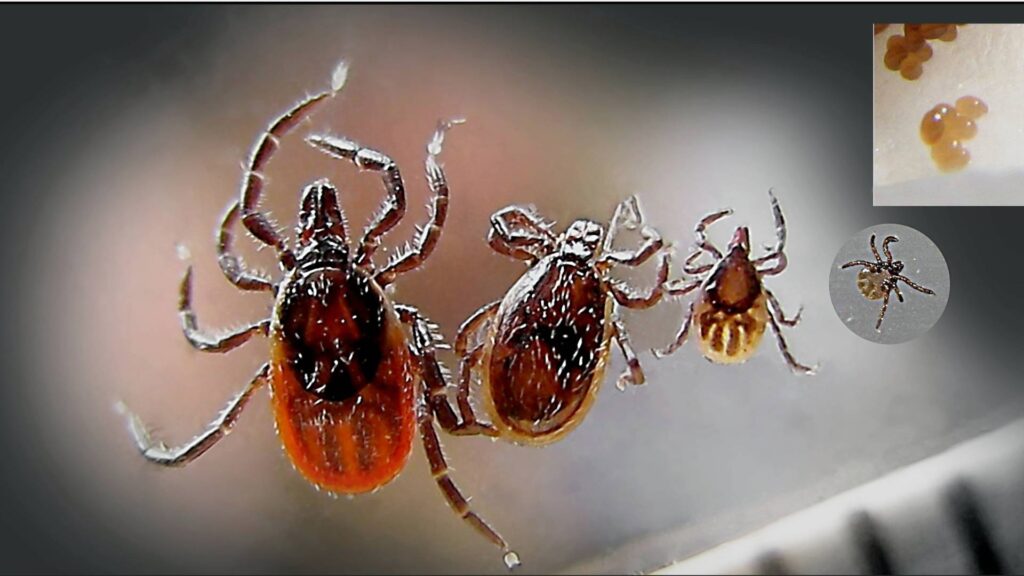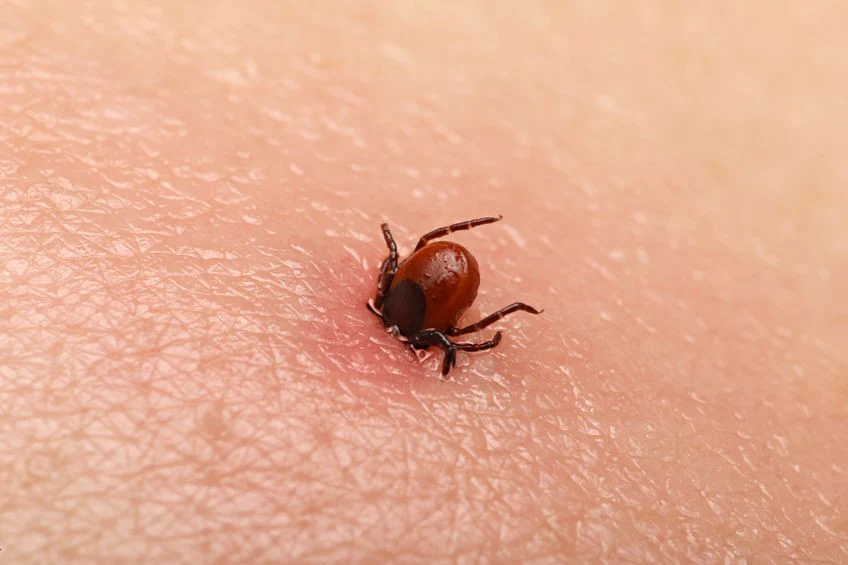Florida’s mild climate stays warm enough that many tick species remain active much of the year, often hitching rides on pets or wild animals. In Fort Lauderdale and nearby Plantation, home and business owners may see ticks attaching to pets, lingering in yards, or even showing up indoors. These small parasites feed on blood and can occasionally transmit diseases, so a tick infestation is more than a minor inconvenience. Below, you will learn why ticks flourish in Florida, how to identify their presence, and why scheduling professional tick treatments in Florida with an experienced exterminator is the most effective course of action. You will also find steps for deterring ticks from returning once they are removed.
Why Ticks Proliferate in Florida
- Warm Temperatures
Florida lacks the extended cold periods that reduce tick activity in many northern states. Year round warmth lets ticks feed and breed with fewer seasonal restrictions. - Humid Conditions
Many tick species need moisture to thrive. Humid air and damp or shaded spots in yards or gardens help ticks survive at various stages of development. - Multiple Hosts
From dogs and cats to raccoons or opossums, ticks rely on animals for blood meals. Florida’s pet friendly communities and local wildlife provide ticks with plenty of feeding options. - High Travel and Shipment
Florida’s strong tourism and shipping can move ticks between locations. These pests may hide in luggage or packages, dropping off in new places if conditions favor them.
Clues Pointing to a Tick Infestation
- Bites on Pets
Dogs or cats might scratch or bite themselves persistently, sometimes around the head, ears, or belly. You may see small dark insects attached to fur. - Bites on People
Tick bites on humans often appear red or itchy, sometimes around the ankles or behind knees. If you find multiple suspicious bites, a thorough check of furniture or bedding may help find ticks. - Visible Ticks
In heavier infestations, ticks might be found crawling on floors, near pet bedding, or on socks after walking through a yard. Ticks do not jump like fleas, but they can climb. - Pet Health Changes
A pet with many tick bites might show signs of lethargy or anemia if the blood loss is high. Tick borne illnesses might cause fever or other symptoms in animals or humans.
Why Ticks Require Swift Action
Though many tick bites only cause itching, certain tick species can pass harmful pathogens to pets or people. Prolonged feeding on animals can lead to open wounds or discomfort. For businesses like kennels or grooming facilities, a tick outbreak can undermine client trust. Fast, thorough treatments remove the current ticks, halt their breeding cycle, and prevent more serious spread.

Why a Tick Exterminator Is Best
Simple home remedies such as spraying or vacuuming might reduce adult tick numbers but often leave eggs or larvae hidden in carpet fibers, yard corners, or pet bedding. A professional tick exterminator inspects both indoor and outdoor areas, pinpointing where ticks gather during each stage of their life cycle. Products like insect growth regulators disrupt eggs from maturing, while indoor and outdoor residual treatments kill adult ticks. Along with occupant tips for yard cleanup or pet care, professional methods more effectively halt future tick waves.
Our Tick Treatments in Florida
- Inspection and Mapping
We start by checking your home interior, including carpets, sofa cushions, or dog bedding, for any signs of ticks. Outdoors, we search shady spots, thick grass, or under decks to find areas where ticks may develop. Identifying these hotspots allows a more targeted approach. - Tailored Treatments
After a basic vacuuming to remove accessible ticks, we apply insect growth regulators and residual sprays or dusts. These kill eggs, larvae, and adult ticks. We focus on baseboards, pet sleeping areas, and yard corners where moisture collects. - Occupant Safety
We often ask people and pets to stay off treated surfaces until everything is dry. Our treatments aim to eliminate ticks but still keep your living space safe. If more concentrated solutions are required, we explain reentry guidelines thoroughly. - Follow Up
Tick eggs might hatch weeks after the first application. Scheduling a follow up visit or occupant vigilance helps ensure any new ticks that emerge are also eliminated before they breed. We may reapply products if signs reappear.
Why Fort Lauderdale Sees Ticks
Fort Lauderdale’s coastal setting and active tourism draw many visitors and animals. Dogs or cats often pick up ticks in parks or along beaches, bringing them back to the home or facility. We concentrate on removing ticks inside by treating carpets and pet zones, then move outdoors to shady yard edges where ticks wait for hosts. We also remind owners to check pets regularly, plus store outdoor gear or linens in ways that discourage hidden ticks.

Managing Ticks in Plantation
Plantation’s suburban layout and green spaces can allow ticks to nest in lawns, near fences, or under shrubs. Our tick exterminator process begins with scanning for adult ticks or eggs in tall grass, corners of yards, or inside homes. After targeting these spots with insect growth regulators and residual products, occupant measures like frequent pet grooming, removing leaf piles, or keeping shrubs trimmed are essential to deny ticks a place to hide. Working together, we remove current ticks and reduce the likelihood of future infestations.
Prevention Tips to Stay Tick Free
- Maintain Yard
Mow grass short, remove fallen leaves, and trim back bushes to reduce cool, moist zones where ticks thrive. Some owners place a small gravel barrier between lawns and wooded areas. - Groom Pets
Use flea and tick combs, checking behind ears, along neck lines, and under legs. Ask vets about monthly tick preventives or collars. Quick detection of ticks on your pets halts spread. - Wash Pet Bedding
Hot water cycles in the washer and high heat in the dryer kill eggs or larvae that might have dropped off the host. Doing this weekly is recommended in tick prone regions. - Inspect Outdoor Items
Ticks can cling to garden tools, beach towels, or sports gear left outside for too long. Shake these off or wipe them down before storing indoors. - Limit Wildlife
Secure trash can lids and remove food scraps that invite raccoons or opossums. Fewer wild animals crossing the property reduces the chance they drop ticks that breed in your yard.
Contact Us for Total Tick Relief
If you suspect ticks after seeing bites on pets, noticing them on carpets, or finding them on socks, do not wait for the infestation to grow. Contact us to learn more or schedule your service. Our tick treatments in Florida use a comprehensive review of your property inside and out, applying insect growth regulators and sprays that kill ticks at every stage. Residents of Fort Lauderdale and Plantation can rely on us to craft a customized plan addressing both indoor tick populations and outdoor egg laying or larvae development. When paired with occupant routines like grooming pets often and trimming yard vegetation, our professional approach secures a cleaner and more comfortable environment.
Maintaining a Tick Free Lifestyle
Florida’s warm climate supports ongoing tick activity, but you can reduce the risks by spotting early signs, acting fast, and upholding a consistent yard and pet care routine. A professional tick exterminator helps by inspecting hidden corners, applying targeted solutions, and advising on occupant tasks that discourage tick reentry. Once your Fort Lauderdale or Plantation property is cleared, continuing small habits like vacuuming floors, washing pet bedding, or limiting wildlife access keeps you and your pets safe from tick bites. This balanced approach ensures you remain well protected from these parasites in Florida’s mild weather.
